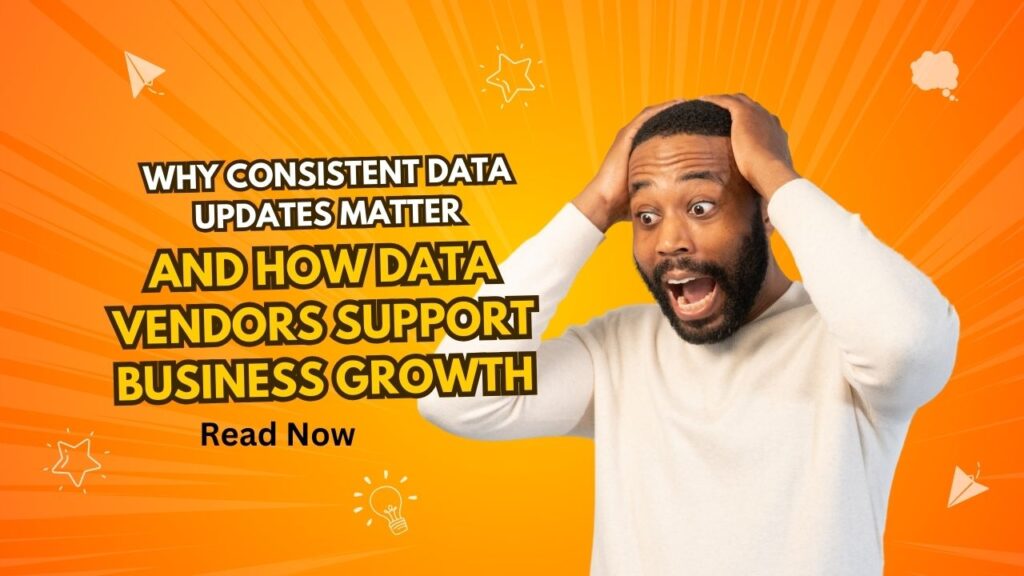Data integrity has become the cornerstone of today’s fast-moving business environment as creating correct and updated data is crucial. Data is information that is commonly used by and in companies to analyze customer behavior, promote sales, and make suitable decisions. Nonetheless, poor-quality data reduces the efficiency and effectiveness of these processes, and in fact, can hamper them completely. This blog looks at why data needs to be updated constantly and how data vendors enable business expansion.
Table of Contents
The Risks of Outdated Data
Businesses handle large volumes of data daily, but when this information becomes outdated, it poses several challenges:
Marketing going weak
- Targeting the wrong audience is counterproductive and a lot of resources are used in the process.
- Incorrect contact information causes many emails to be returned to the sender’s server and not read hence resulting in low engagement.
Poor Customer Experience
- Consumers expect the business to know them. With wrong or partially completed data the user becomes frustrated.
- Hence giving irrelevant offers or giving info that may be outdated is lethal as far as trust is concerned.
Operational Inefficiencies
- There is a culture of working on errors rather than on productive work within the teams.
- They also reduce efficient work output because more records create more work with the same results.

Why Updating Data Must Be Consistent?
Reliable updates make it possible for businesses to use up-to-date and correct information for their operation. Here’s how updated data vendor jumps growth:
Better Methods for generating and converting leads
- Having correct contact details is useful in contact development initiatives.
- Newer data makes it possible to reach out to prospects at the right time with relevant products.
Improve Customer categorization
- With the current information, it is easier for business to segment their audience.
- This will allow for a specific type of marketing to be adopted since the customer’s wishes can be fully considered.
Data-Driven Decision Making
- The use of the latest data gives more accurate information on the market.
- Another advantage is that strategies can be quickly modified to fit current trends for any business to remain relevant.
Cost Efficiency
- A correct database provider helps in avoiding unnecessary time spent in retrieving phone numbers of the wrong contacts.
- Essentially it reduces the chances of incurring losses since the handling of data is done in a clean environment.
Analyzing the data vendors for business growth
Refining the kind of data used can also make a huge impact on the quality of data received from the data vendor. Here’s how they contribute:
Data Verification and Validation
- This is important with vendors using sophisticated instruments to verify and corroborate uphold information.
- This helps avoid giving businesses wrong and irrelevant information in the process of decision-making.
Real-Time Updates
- Vendors keep their database current and accurate because they constantly monitor and update information.
- This saves businesses from the extreme consequences that stem from the use of wrong data.
Scalability for Growing Needs
- While expanding, data vendors are capable of satisfying such increased necessities.
- This helps to maintain value and increase the capacity of data handling during growth spurts.
Compliance with Data Regulations
- Responsible vendors therefore see to it that data practices are in compliance with legal and ethical.
- This safeguards organizations from probable fines connected with misuse of data.
Key Features to Look for in a Data Vendor
The consistency of data is vital to handling and finding the right data vendor. Here are the essential features to consider:
Proven Expertise
- It is also important to select data vendors that have experienced and well-documented delivery of deep data solutions.
- You should look at reviews and other testimonials to determine the efficiency of such services.
Advanced Technology
- It is also important that data vendors rely upon canters for data validation and for containing the latest information.
- The readiness of automation is one strong suit when it comes to real-time precision.
Scalability and Flexibility
- Check and ensure that the vendor is capable of providing your business with the current as well as the future needs of data.
- Flexibility is important as expectations switch in an organization.
Transparent Practices
- This paper should draw a clear understanding of data sources and methods among the vendors.
- Guards have to be set up to prevent the improper disclosure of information.
What Can Be Done to Ensure Consistent Data Update?
In addition to partnering with a reliable data vendor, businesses can adopt internal strategies to ensure data remains accurate:
- Regular Database Audits: Every now and then, update and sanitize internal records by pulling out unnecessary and unwanted information.
- Automation Tools: There is always software that will notify you when data needs to be updated or has become obsolete.
- Collaboration with Vendors: It is required to coordinate with data vendors to develop a proper timeline to set for updating first-hand data.
- Employee Training: Make sure that teams know why data has to be accurate and what measures have to be taken.
Conclusion
Businesses need to have fresh data for them to be relevant and competitive in the market today. Through the updating of good information, corporations can better serve their customers, promote and sell their products well, and make sound decisions.
Being committed to the finance of regular data refreshes is the groundwork for success in the future. Accuracy to the data and see your business boom.



